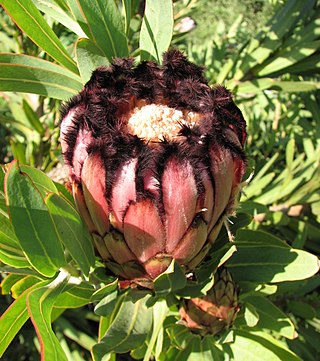
Protea neriifolia, also known as the narrow-leaf sugarbush, oleander-leaved sugarbush, blue sugarbush, or the oleanderleaf protea, is a flowering plant in the genus Protea, which is endemic to South Africa.

Protea laurifolia, also known as the grey-leaf sugarbush, is a shrub from South Africa. It is native to the Cape Provinces of South Africa.

Protea comptonii, also known as saddleback sugarbush, is a smallish tree of the genus Protea in the family Proteaceae. It is found in South Africa and Eswatini.

Protea magnifica, commonly known as the queen protea, is a shrub, which belongs to the genus Protea within the family Proteaceae, and which is native to South Africa.

Protea rubropilosa, also known as the Transvaal sugarbush, escarpment sugarbush or Transvaal mountain sugarbush, is a flowering tree, that belongs to the genus Protea in the family Proteaceae. The plant only occurs in South Africa.

Protea pudens, also known as the bashful sugarbush, is a low-growing, groundcover-like, flowering shrub in the genus Protea. It is only found growing in the wild in a small area in the Western Cape province of South Africa.

Protea stokoei is a flowering shrub which belongs to the genus Protea. The plant is endemic to South Africa. It is found in the Kogelberg and Greenland mountains around Elgin.

Protea susannae, also known as stink-leaf sugarbush, is a flower-bearing shrub of the genus Protea. The plant is endemic to the southwestern Cape Region of South Africa.

Protea glabra, also called the Clanwilliam sugarbush, is a flowering shrub belonging to the genus Protea.

Protea witzenbergiana, or Swan sugarbush, is a flowering shrub of the genus Protea.

Protea lacticolor or the Hottentot sugarbush, Hottentot white sugarbush or Hottentot's Holland sugarbush, is a flowering shrub of the Protea genus. It is also known as the Hottentotwitsukkerbos. The plant is endemic to South Africa and is found from the Slanghoek to the Hottentots Holland Mountains and also the Groenlandberg.
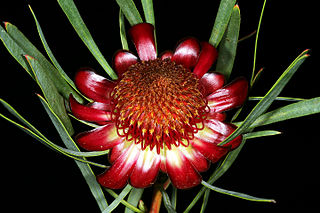
Protea acuminata, also known in English as the black-rim sugarbush, or in the Afrikaans language as sederbergsuikerbos, is a flowering shrub belonging to the genus Protea. The plant is endemic to South Africa. There are isolated populations at Nieuwoudtville, and in the Cederberg, Stettynskloof and Riviersonderend Mountains. It can grow as an upright tree. It can become up to two metres in height. It blooms from June to September, with the peak of July to August. Periodic wildfires may destroy the adult plants, but the seeds can survive such an event. The seeds are dispersed by means of the wind. The plant is monoecious with both sexes in each flower. It is unknown what causes the pollination to occur. The plant grows in sandy plains and coastal lowlands from sea-level to altitudes of 400 metres. It is a widespread species which is not in danger, and the conservation status has been assessed as 'least concern'.

Protea holosericea, commonly known as the Sawedge Sugarbush, is a flowering shrub belonging to the Protea genus. The plant is endemic to South Africa and is found only on Sawedge Peak and Rabiesberg, two adjacent peaks in the Kwadousberg Mountains in the Western Cape.

Protea lorifolia, in English called the strap-leaved sugarbush, strap-leaved protea or strap-leaf sugarbush is a flowering shrub which belongs to the genus Protea.
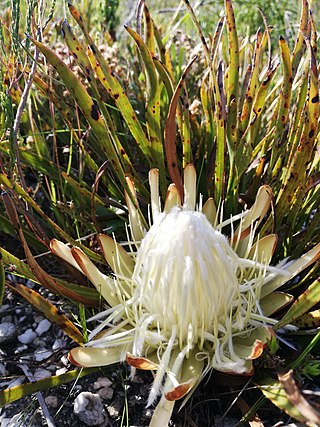
Protea aspera, commonly known as rough leaf sugar bush or aardroos suikerbos, is a flowering shrub that belongs to the well-known Protea genus. The plant is endemic to South Africa and is found in the Kleinrivierberge, Bredasdorpberge and Garcia's Pass.
Protea restionifolia, which is also known as the Reed-leaf sugarbush, is a flowering shrub endemic to the Western Cape province of South Africa where it is found from the upper part of the Breede River Valley through the Bot River Valley to Wolseley and the Koue Bokkeveld Mountains.
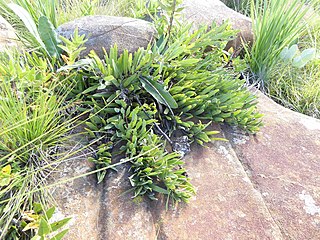
Protea parvula, also known as the dainty sugarbush, or kleinsuikerbos in Afrikaans, is a small flowering shrub belonging to the genus Protea.

Protea caespitosa, also known as hottentot bishop sugarbush or bishop sugarbush, is a flowering shrub belonging to the genus Protea which is only found growing in the wild in South Africa.

Protea punctata, also known as the water sugarbush or water white sugarbush, is a shrub belonging to the genus Protea which is found growing in the wild in South Africa.
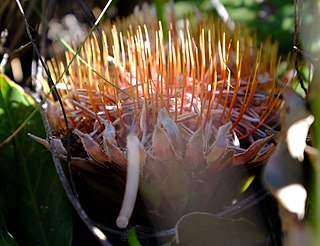
Protea scolopendriifolia, also known as the harts-tongue-fern sugarbush or hart's-tongue-fern sugarbush, is a flowering shrub endemic to South Africa, where it occurs in both the Western and Eastern Cape. It is found from the Cederberg, through the Kogelberg, Riviersonderend Mountains and Swartberg, to the Kouga Mountains. It blooms in Spring, from September to December.




















